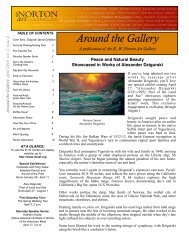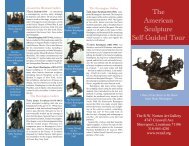September
download - RW Norton Art Gallery
download - RW Norton Art Gallery
- No tags were found...
You also want an ePaper? Increase the reach of your titles
YUMPU automatically turns print PDFs into web optimized ePapers that Google loves.
Around the Gallery <strong>September</strong> 2009, vol. 2, issue 9<br />
FEATURED ARTIST IN THE<br />
COLLECTION: Sam Colt: The Name<br />
that Won the West<br />
Colt Revolver, Single-Action Army Model<br />
Firearms Gallery<br />
In the nineteenth century, Sam Colt's name was<br />
synonymous with his revolving-breech pistol, a weapon that<br />
was said to have "won the West." The second youngest of<br />
seven children, Colt was born in Hartford, Connecticut on<br />
July 19, 1814. A confident, even reckless boy, he showed an<br />
early interest in explosives and weapons. While on a voyage<br />
to India as an apprentice sailor, young Colt designed an<br />
innovative gun with an automatic, revolving chamber.<br />
In 1835, he took out his first patent and founded Colt’s<br />
Patent Fire Arms Company in Paterson, New Jersey. His<br />
pistol was unique. Its design allowed several shots to be<br />
fired in succession without reloading. A single-shot weapon<br />
took 20 seconds to reload -- a dangerous interval, especially<br />
for frontiersmen and soldiers fighting Indians who could fire<br />
six arrows or run 150 yards with spear and tomahawks in<br />
that time. Army officers used Colt's weapon in the 1830s,<br />
but production defects prevented widespread approval of the<br />
firearm. Colt improved manufacturing, and by 1848 his<br />
products were safer.<br />
Colt’s weapons contributed to the U.S. Army's success<br />
in the Mexican War, and to the resulting westward<br />
expansion of American territory. A Texas Ranger, Captain<br />
Samuel Walker, wrote the inventor a testimonial that read, in<br />
part: "Your pistols...[are] the most perfect weapon in the<br />
World... to keep the various warlike tribes of Indians and<br />
marauding Mexicans in subjection."<br />
Throughout the 1850s, Colt continued to improve his<br />
now-famous revolver. He refined his manufacturing process<br />
into a model of precision, automation, and process<br />
integration. He also saw the value of mythmaking, and<br />
marketed his gun as an essential part of the American<br />
frontier. In addition to the military, his customers included<br />
Forty-Niners heading to the California Gold Rush;<br />
emigrants headed west; cowboys; and lawmen on the<br />
nation's western frontier. A slogan of the day went, "God<br />
created men equal; Colonel Colt made them equal..." The<br />
inventor died a year after the Civil War broke out, at the<br />
young age of forty-six, having never fired a gun at another<br />
person.<br />
Many of Sam Colt’s handguns are on display in the Gun<br />
Room in the South Wing of the Norton.<br />
Jennifer DeFratis, Tour and Special Events Coordinator<br />
FEATURED ARTWORK IN THE<br />
COLLECTION: Puritan by<br />
Augustus Saint-Gaudens<br />
The stern-faced gentleman represented in Puritan by<br />
Augustus Saint-Gaudens is the very embodiment of those<br />
early American settlers. His stern face clearly reflects his<br />
work ethic. Even while strolling in the woods [pine needles<br />
underfoot], he is frowning. Puritans simply couldn’t have<br />
fun. If they were having fun, they weren’t working and if<br />
they weren’t working they were on the road to displeasing<br />
God and possibly losing their place in heaven.<br />
The Protestant (or Puritan) work ethic emerged after<br />
combining the doctrines of spiritual leaders Martin Luther<br />
and John Calvin. Both believed work was the will of God,<br />
but that a person may choose his profession AND his<br />
religion and work very hard to make life the very best it<br />
could be. They re-invested profits in their businesses, and<br />
believed success was evidence of being one of God’s chosen<br />
elect. By the 18 th century diligence in work, scrupulous use<br />
of time, and deferment of pleasure had become a part of the<br />
popular philosophy of work in the Western world.<br />
The early adventurers to America were looking for a<br />
new Eden, with no hope or illusions of a life of ease. From<br />
their viewpoint, the moral life was one of hard work and<br />
determination, and they approached the task of building a<br />
new world in the wilderness as an opportunity to prove their<br />
own moral worth.<br />
Jennifer DeFratis, Tour and Special Events Coordinator<br />
Puritan by Augustus Saint-Gaudens<br />
American History Gallery<br />
4





